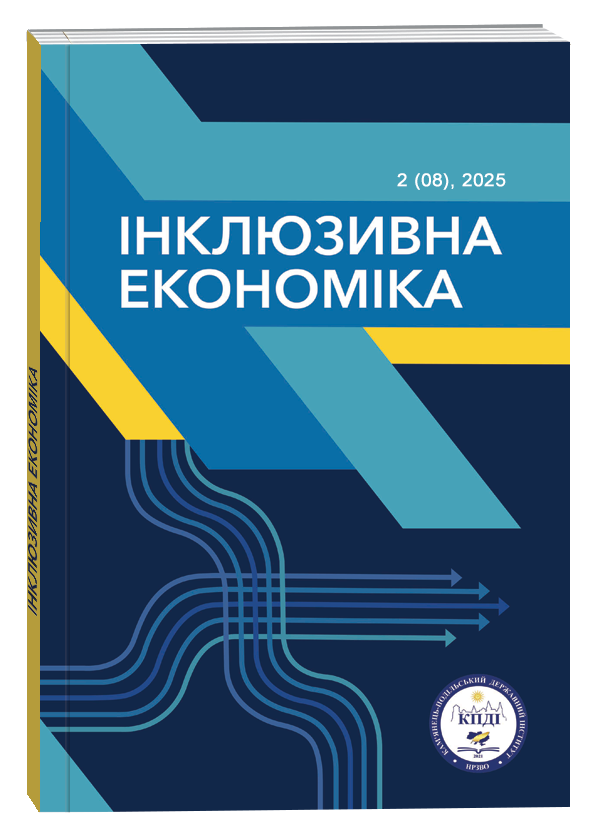FINANCIAL SUPPORT FOR HIGHER EDUCATION IN THE CONTEXT OF BUILDING AN INCLUSIVE ECONOMY: CHALLENGES AND DIRECTIONS FOR TRANSFORMATION
DOI:
https://doi.org/10.32782/inclusive_economics.8-10Keywords:
higher education funding, tuition fees, inclusive economy, financial architecture, contract-based education, human capitalAbstract
In the context of global transformations of the socio-economic landscape, ensuring access to higher education is a determining factor in the formation of an inclusive economic model based on the principles of equal opportunities, social integration, and economic sustainability. The issue of financing higher education in Ukraine, particularly through regulatory mechanisms such as setting indicative costs, raises the question of harmonizing economic efficiency with social justice. The aim of the study is to conceptualize the relationship between the financial mechanisms of higher education and inclusive economic development, with the definition of strategies for overcoming barriers to accessibility. The methodological approach integrates concepts of human capital, institutional analysis, and inclusive growth paradigms, complemented by an assessment of regulations and statistical data on the cost of education and regional disparities. The study found that current financial instruments, particularly unified pricing, limit access to education for socially vulnerable groups, exacerbating inequality and hindering social mobility. At the same time, unregulated segments of the education market are prone to quality decline due to price dumping. The conclusions emphasize the need to reform the higher education financial system by introducing adaptive regulatory instruments that take into account regional specifics and social vulnerability. It is proposed to develop a mechanism for social education contracts that combines state support with targeted employment of graduates, as well as the introduction of an education accessibility index that would adjust pricing to take into account economic and demographic factors. Further research should focus on developing methodological principles for assessing the contribution of higher education institutions to social inclusion, taking into account demographic, economic, and cultural indicators. This will contribute to the formation of a sustainable financing model based on the principles of social justice, economic efficiency, and sustainable development.
References
Жуковська А., Бречко О. Оцінка рівня інклюзивного розвитку економіки України. Економіка. 2024. № 12 (3). С. 425–440. DOI: https://doi.org/10.2478/eoik-2024-0038
Качула С. В. Фінансування вищої освіти: сучасні тенденції та перспективи. Інвестиції: практика та досвід. 2023. № 18. DOI: https://doi.org/10.32702/2306-6814.2023.18.7
Кириленко О., Жадан О. Модель фінансування вищої освіти в Україні: зміна пріоритетів. Світ фінансів. 2023. № 2(75). С. 140–154. URL: http://sf.wunu.edu.ua/index.php/sf/article/view/1613
Лондар С. Л. Удосконалення фінансування системи освіти України як передумова успішного реформування : монографія. ДНУ «Інститут освітньої аналітики». Київ, 2021. 274 с.
Паулик А. Формування конкурентних переваг економіки регіону: інклюзивний аспект. Економіка та суспільство. 2023. № 55. DOI: https://doi.org/10.32782/2524-0072/2023-55-91
Про розподіл видатків державного бюджету між закладами вищої освіти на основі показників їх освітньої, наукової та міжнародної діяльності. Постанова Кабінету Міністрів України від 24 грудня 2019 року № 1146 зі змінами. URL: https://zakon.rada.gov.ua/laws/show/1146-2019-%D0%BF#Text (дата звернення: 01.05.2025)
Про Деякі питання запровадження індикативної собівартості. Постанова Кабінету Міністрів України від 03 березня 2020 року № 191 зі змінами. URL: https://zakon.rada.gov.ua/laws/show/191-2020-%D0%BF#Text (дата звернення: 01.05.2025)
Чернега В. Фінансове забезпечення закладів вищої освіти як інструмент соціально-економічного розвитку країни. Економіка та суспільство. 2023. № 47. DOI: https://doi.org/10.32782/2524-0072/2023-47-81
Уніят А. В., Юзвін З. I. Концепція інклюзивної економіки в контексті сучасного сталого розвитку країн. Ефективна економіка. 2019. № 2. URL: http://www.economy.nayka.com.ua/?op=1&z=6905
Шевчук О. В. Інклюзивна економіка та ринок праці: роль освіти у формуванні конкурентоспроможних працівників з різними потребами. Інклюзивна економіка. 2023. № 1 С. 48–51. DOI: https://doi.org/10.32782/inclusive_economics.1-8
Ponomarenko V. (2022) State Order for the Training of Specialists with Higher Education and Optimisation of the Higher Education Network. Journal of Higher Education Theory and Practice. Vol. 22, issue 28 (31 December). – P. 127–135. DOI: https://doi.org/10.33423/jhetp.v22i18.5705
Zhukovska, A., Brechko, O. (2024) Otsinka rivnia inkliuzyvnoho rozvytku ekonomiky Ukrainy [Assessment of the level of inclusive development of the Ukrainian economy]. Ekonomika. № 12 (3), p. 425–440. DOI: https://doi.org/10.2478/eoik-2024-0038
Kachula S. V. (2023) Finansuvannia vyshchoi osvity: suchasni tendentsii ta perspektyvy. [Financing higher education: current trends and prospects]. Investytsii: praktyka ta dosvid. № 18. DOI: https://doi.org/10.32702/2306-6814.2023.18.7
Kyrylenko, O., Zhadan O. (2023) Model finansuvannia vyshchoi osvity v Ukraini: zmina priorytetiv [The model of financing higher education in Ukraine: changing priorities]. Svit finansiv. Vyp. 2. P. 140–154. Available at: http://sf.wunu.edu.ua/index.php/sf/article/view/1613
Londar S. L. (2021) Udoskonalennia finansuvannia systemy osvity Ukrainy yak peredumova uspishnoho reformuvannia [Improving the financing of Ukraine's education system as a prerequisite for successful reform]: monohrafiia. DNU «Instytut osvitnoi analityky». Kyiv, 274 p.
Paulyk, A. (2023). Formuvannia konkurentnykh perevah ekonomiky rehionu: inkliuzyvnyi aspect [Formation of competitive advantages of the regional economy: inclusive aspect]. Ekonomika ta suspilstvo. № 55. DOI: https://doi.org/10.32782/2524-0072/2023-55-91
Pro rozpodil vydatkiv derzhavnoho biudzhetu mizh zakladamy vyshchoi osvity na osnovi pokaznykiv yikh osvitnoi, naukovoi ta mizhnarodnoi diialnosti. Postanova Kabinetu Ministriv Ukrainy vid 24 hrudnia 2019 roku № 1146 zi zminamy. Available at: https://zakon.rada.gov.ua/laws/show/1146-2019-%D0%BF#Text (accessed May 01, 2025)
Pro deiaki pytannia zaprovadzhennia indykatyvnoi sobivartosti. [Some issues related to the introduction of indicative cost] Postanova Kabinetu Ministriv Ukrainy vid 03 bereznia 2020 roku № 191 zi zminamy. Available at: https://zakon.rada.gov.ua/laws/show/191-2020-%D0%BF#Text (accessed May 01, 2025).
Cherneha, V. (2023). Finansove zabezpechennia zakladiv vyshchoi osvity yak instrument sotsialno-ekonomichnoho rozvytku krainy [Financial support of higher education institutions as a tool for socio-economic development of the country]. Ekonomika ta suspilstvo, № 47. DOI: https://doi.org/10.32782/2524-0072/2023-47-81
Uniiat A. V., Yuzvin Z. I. (2019) Kontseptsiia inkliuzyvnoi ekonomiky v konteksti suchasnoho staloho rozvytku krain [The concept of inclusive economy in the context of modern sustainable development of countries]. Efektyvna ekonomika. № 2. Available at: http://www.economy.nayka.com.ua/?op=1&z=6905
Shevchuk O.V. (2023) Inkliuzyvna ekonomika ta rynok pratsi: rol osvity u formuvanni konkurentospromozhnykh pratsivnykiv z riznymy potrebamy. Inkliuzyvna ekonomika. № 1. P. 48–51. DOI: https://doi.org/10.32782/inclusive_economics.1-8
Ponomarenko V. (2022) State Order for the Training of Specialists with Higher Education and Optimisation of the Higher Education Network. Journal of Higher Education Theory and Practice. Vol. 22, issue 28 (31 December). P. 127–135. DOI: https://doi.org/10.33423/jhetp.v22i18.5705



